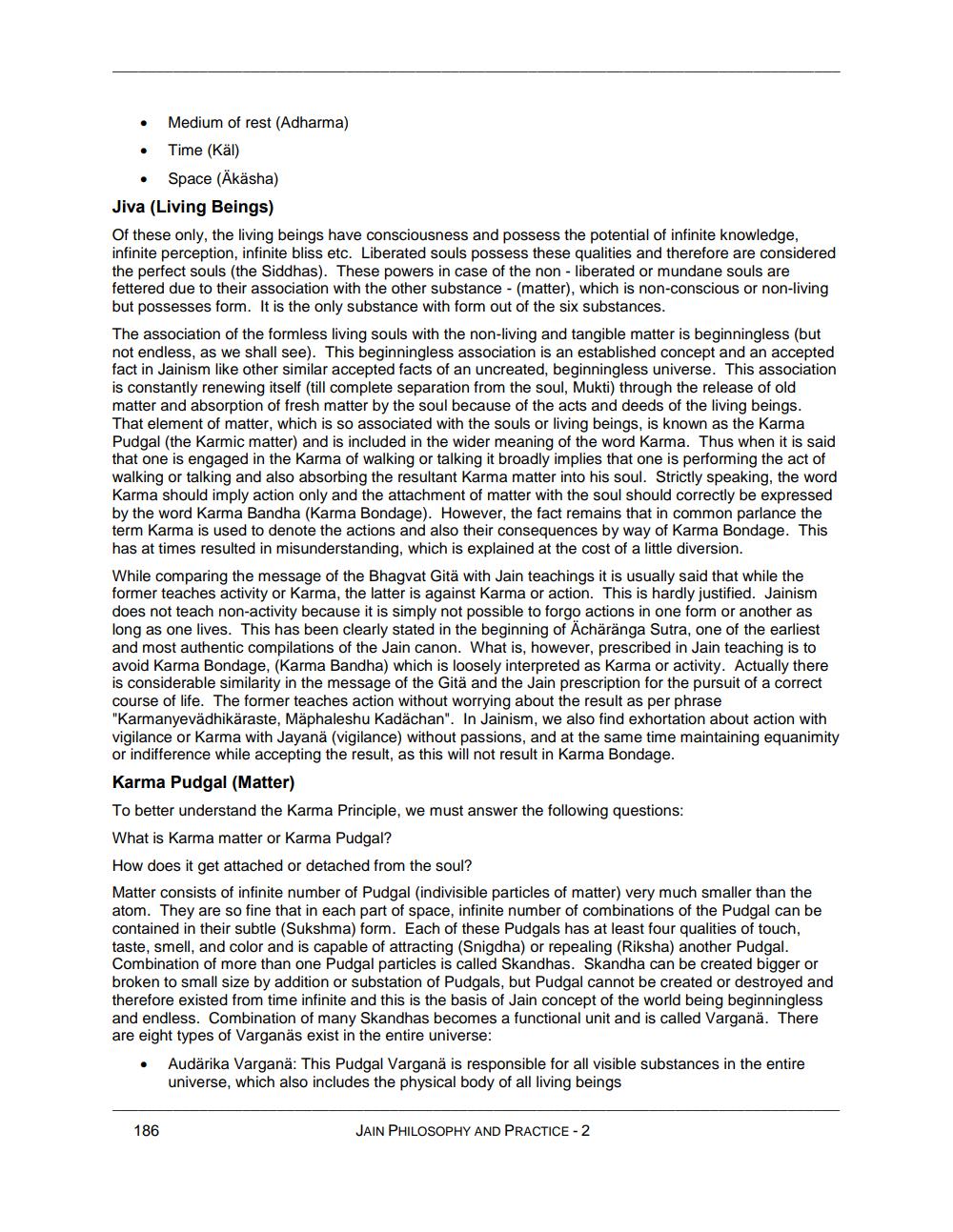________________
• Medium of rest (Adharma) • Time (Käl)
• Space (Äkäsha) Jiva (Living Beings) Of these only, the living beings have consciousness and possess the potential of infinite knowledge, infinite perception, infinite bliss etc. Liberated souls possess these qualities and therefore are considered the perfect souls (the Siddhas). These powers in case of the non- liberated or mundane souls are fettered due to their association with the other substance - (matter), which is non-conscious or non-living but possesses form. It is the only substance with form out of the six substances. The association of the formless living souls with the non-living and tangible matter is beginningless (but not endless, as we shall see). This beginningless association is an established concept and an accepted fact in Jainism like other similar accepted facts of an uncreated, beginningless universe. This association is constantly renewing itself (till complete separation from the soul, Mukti) through the release of old matter and absorption of fresh matter by the soul because of the acts and deeds of the living beings. That element of matter, which is so associated with the souls or living beings, is known as the Karma Pudgal (the Karmic matter) and is included in the wider meaning of the word Karma. Thus when it is said that one is engaged in the Karma of walking or talking it broadly implies that one is performing the act of walking or talking and also absorbing the resultant Karma matter into his soul. Strictly speaking, the word Karma should imply action only and the attachment of matter with the soul should correctly be expressed by the word Karma Bandha (Karma Bondage). However, the fact remains that in common parlance the term Karma is used to denote the actions and also their consequences by way of Karma Bondage. This has at times resulted in misunderstanding, which is explained at the cost of a little diversion. While comparing the message of the Bhagvat Gitä with Jain teachings it is usually said that while the former teaches activity or Karma, the latter is against Karma or action. This is hardly justified. Jainism does not teach non-activity because it is simply not possible to forgo actions in one form or another as long as one lives. This has been clearly stated in the beginning of Achäränga Sutra, one of the earliest and most authentic compilations of the Jain canon. What is, however, prescribed in Jain teaching is to avoid Karma Bondage, (Karma Bandha) which is loosely interpreted as Karma or activity. Actually there is considerable similarity in the message of the Gitä and the Jain prescription for the pursuit of a correct course of life. The former teaches action without worrying about the result as per phrase "Karmanyevädhikäraste, Mäphaleshu Kadächan". In Jainism, we also find exhortation about action with vigilance or Karma with Jayanä (vigilance) without passions, and at the same time maintaining equanimity or indifference while accepting the result, as this will not result in Karma Bondage. Karma Pudgal (Matter) To better understand the Karma Principle, we must answer the following questions: What is Karma matter or Karma Pudgal? How does it get attached or detached from the soul? Matter consists of infinite number of Pudgal (indivisible particles of matter) very much smaller than the atom. They are so fine that in each part of space, infinite number of combinations of the Pudgal can be contained in their subtle (Sukshma) form. Each of these Pudgals has at least four qualities of touch, taste, smell, and color and is capable of attracting (Snigdha) or repealing (Riksha) another Pudgal. Combination of more than one Pudgal particles is called Skandhas. Skandha can be created bigger or broken to small size by addition or substation of Pudgals, but Pudgal cannot be created or destroyed and therefore existed from time infinite and this is the basis of Jain concept of the world being beginningless and endless. Combination of many Skandhas becomes a functional unit and is called Varganä. There are eight types of Varganäs exist in the entire universe:
Audärika Varganä: This Pudgal Varganä is responsible for all visible substances in the entire universe, which also includes the physical body of all living beings
186
JAIN PHILOSOPHY AND PRACTICE -2




